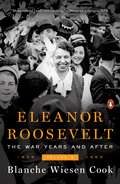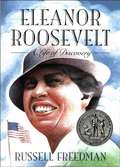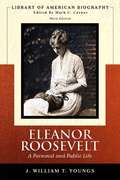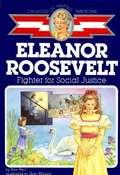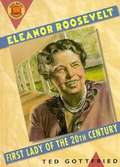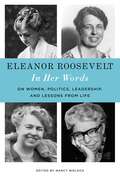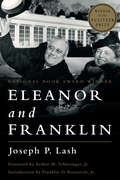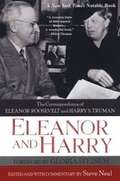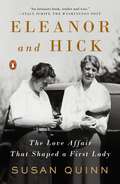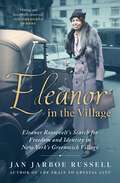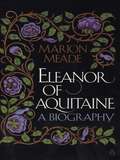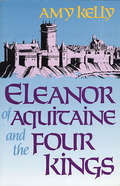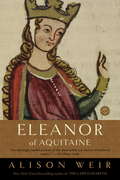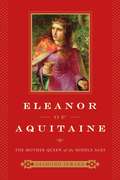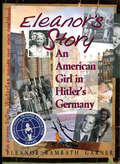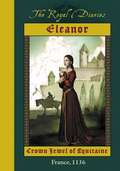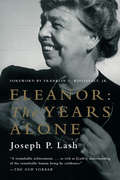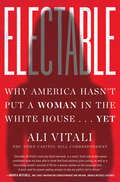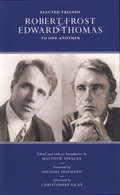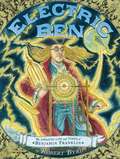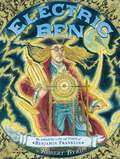- Table View
- List View
Eleanor Roosevelt, Volume 3: The War Years and After, 1939-1962
by Blanche Wiesen Cook"Outstanding... A winning concluding volume in a series that does for Eleanor Roosevelt what Robert Caro has done for Lyndon Johnson." -Kirkus Reviews, Starred ReviewThe final volume in the definitive biography of America's greatest first lady.Historians, politicians, critics, and readers everywhere have praised Blanche Wiesen Cook's biography of Eleanor Roosevelt as the essential portrait of a woman who towers over the twentieth century. The third and final volume takes us through World War II, FDR's death, the founding of the UN, and Eleanor Roosevelt's death in 1962. It follows the arc of war and the evolution of a marriage, as the first lady realized the cost of maintaining her principles even as the country and her husband were not prepared to adopt them. Eleanor Roosevelt continued to struggle for her core issues--economic security, New Deal reforms, racial equality, and rescue--when they were sidelined by FDR while he marshaled the country through war. The chasm between Eleanor and Franklin grew, and the strains on their relationship were as political as they were personal. She also had to negotiate the fractures in the close circle of influential women around her at Val-Kill, but through it she gained confidence in her own vision, even when forced to amend her agenda when her beliefs clashed with government policies on such issues as neutrality, refugees, and eventually the threat of communism. These years--the war years--made Eleanor Roosevelt the woman she became: leader, visionary, guiding light. FDR's death in 1945 changed her world, but she was far from finished, returning to the spotlight as a crucial player in the founding of the United Nations. This is a sympathetic but unblinking portrait of a marriage and of a woman whose passion and commitment has inspired generations of Americans to seek a decent future for all people. Modest and self-deprecating, a moral force in a turbulent world, Eleanor Roosevelt was unique.From the Hardcover edition.
Eleanor Roosevelt: A Life of Discovery
by Russell FreedmanAlmost anything scares young Eleanor: mice, the dark, and a host of imaginary dangers. But she learns to hide her feelings - her father disapproves of fear, and she longs only to please him. She knows she will always disappoint her beautiful, socialite mother, because Eleanor is painfully shy and plain.<P><P> As a young debutante in Manhattan, she spends her days teaching needy children and touring crowded tenements. There, she makes a life-changing discovery that later enables her to redefine the role of America's first lady - being shy doesn't matter as long as she's helping others.<P> Newbery Medal Honor book
Eleanor Roosevelt: A Personal and Public Life (3rd edition)
by J. William T. YoungsNew edition of a biography of one of the United States' most admired women. Youngs (Eastern Washington U.) provides both personal and political details of Eleanor Roosevelt's life, from childhood through and beyond the death of her husband Franklin, exploring her life as First Lady and the following years when she developed her own political personality. Annotation c. Book News, Inc., Portland, OR (booknews.com)
Eleanor Roosevelt: Fighter for Social Justice (Childhood of Famous Americans Series)
by Ann WeilYoung people will identify with Eleanor's difficulty in spelling. Many things were difficult for her, and she had to work very hard. Hard work won her success. A fine book for a book report.
Eleanor Roosevelt: First Lady of the Twentieth Century
by Ted GottfriedThis biography tells the story of Eleanor Roosevelt, First Lady in the White House.
Eleanor Roosevelt: First Lady of the World
by Charles P. GravesBiography of Eleanor Roosevelt for children
Eleanor Roosevelt: First Lady of the World (Women of Our Time)
by Doris FaberEleanor Roosevelt's life was as complex and changing as any in the 20th century. An outcast child, debutante, wife and mother, she became the beloved first lady of the United States and the world. Her story is written "as intimate(ly) as a conversation. ... A unique work of art". --The Horn Book. Copyright © Libri GmbH. All rights reserved.
Eleanor Roosevelt: On Women, Politics, Leadership, and Lessons from Life
by Nancy WolochThis illustrated, first of its kind collection of excerpts from Eleanor Roosevelt's newspaper columns, radio talks, speeches, and correspondence speaks directly to the challenges we face today.Acclaimed for her roles in politics and diplomacy, first lady Eleanor Roosevelt was also a prolific author, journalist, lecturer, broadcaster, educator, and public personality. Using excerpts from her books, columns, articles, press conferences, speeches, radio talks, and correspondence, Eleanor Roosevelt: In Her Words tracks her contributions from the 1920s, when she entered journalism and public life; through the White House years, when she campaigned for racial justice, the labor movement, and "the forgotten woman;" to the postwar era, when she served at the United Nations and shaped the Universal Declaration of Human Rights. Selections touch on Roosevelt's early entries in women's magazines ("Ten Rules for Success in Marriage"), her insights on women in politics ("Women Must Learn to Play the Game As Men Do"), her commentary on World War II ("What We Are Fighting For"), her work for civil rights ("The Four Equalities"), her clash with Soviet delegates at the UN ("These Same Old Stale Charges"), and her advice literature ("If You Ask Me"). Surprises include her unique preparation for leadership, the skill with which she defied critics and grasped authority, her competitive stance as a professional, and the force of her political messages to modern readers. Scorning the "America First" mindset, Eleanor Roosevelt underlined the interdependence of people and of nations. Eleanor Roosevelt: In Her Words illuminates her achievement as a champion of civil rights, human rights, and democratic ideals.
Eleanor and Franklin
by Joseph P. LashIn his extraordinary biography of the major political couple of the twentieth century, Joseph P. Lash reconstructs from Eleanor Roosevelt's personal papers her early life and four-decade marriage to the four-time president who brought America back from the Great Depression and helped to win World War II. The result is an intimate look at the vibrant private and public worlds of two incomparable people.<P><P> Winner of the Pulitzer Prize<P> Winner of the National Book Award
Eleanor and Harry: The Correspondence of Eleanor Roosevelt and Harry S. Truman
by Steve NealEleanor Roosevelt and Harry S. Truman were two towering giants of twentieth-century American history. They were also unlikely allies, overcoming differences in background and opinion to become steadfast supporters of each other. These more than 250 letters written over nearly twenty years offer a revealing portrait of the former first lady and American president through their lively exchanges on such important issues as the burgeoning Cold War, the creation of the state of Israel, the civil rights movement, the breakup of colonial empires, the formative years of the United Nations, and their respective visions of postwar America, while providing a rare, fully human study of an enduring friendship that helped to shape our world.
Eleanor and Hick: The Love Affair That Shaped a First Lady
by Susan QuinnA warm, intimate account of the love between Eleanor Roosevelt and reporter Lorena Hickok--a relationship that, over more than three decades, transformed both women's lives and empowered them to play significant roles in one of the most tumultuous periods in American historyIn 1932, as her husband assumed the presidency, Eleanor Roosevelt entered the claustrophobic, duty-bound existence of the First Lady with dread. By that time, she had put her deep disappointment in her marriage behind her and developed an independent life--now threatened by the public role she would be forced to play. A lifeline came to her in the form of a feisty campaign reporter for the Associated Press: Lorena Hickok. Over the next thirty years, until Eleanor's death, the two women carried on an extraordinary relationship: They were, at different points, lovers, confidantes, professional advisors, and caring friends. They couldn't have been more different. Eleanor had been raised in one of the nation's most powerful political families and was introduced to society as a debutante before marrying her distant cousin, Franklin. Hick, as she was known, had grown up poor in rural South Dakota and worked as a servant girl after she escaped an abusive home, eventually becoming one of the most respected reporters at the AP. Her admiration drew the buttoned-up Eleanor out of her shell, and the two quickly fell in love. For the next thirteen years, Hick had her own room at the White House, next door to the First Lady. These fiercely compassionate women inspired each other to right the wrongs of the turbulent era in which they lived. During the Depression, Hick reported from the nation's poorest areas for the WPA, and Eleanor used these reports to lobby her husband for New Deal programs. Hick encouraged Eleanor to turn their frequent letters into her popular and long-lasting syndicated column "My Day," and to befriend the female journalists who became her champions. When Eleanor's tenure as First Lady ended with FDR's death, Hick pushed her to continue to use her popularity for good--advice Eleanor took by leading the UN's postwar Human Rights Commission. At every turn, the bond these women shared was grounded in their determination to better their troubled world. Deeply researched and told with great warmth, Eleanor and Hick is a vivid portrait of love and a revealing look at how an unlikely romance influenced some of the most consequential years in American history.From the Hardcover edition.
Eleanor in the Village: Eleanor Roosevelt's Search for Freedom and Identity in New York's Greenwich Village
by Jan Jarboe RussellA vivid and incisive account of a mostly unknown yet critical chapter in the life of Eleanor Roosevelt—when she moved to New York&’s Greenwich Village, shed her high-born conformity, and became the progressive leader who pushed for change as America&’s First Lady.Hundreds of books have been written about FDR and Eleanor, both together and separately, but yet she remains a compelling and elusive figure. And, not much is known about why in 1920, Eleanor suddenly abandoned her duties as a mother of five and moved to Greenwich Village, then the symbol of all forms of transgressive freedom—communism, homosexuality, interracial relationships, and subversive political activity. Now, in this fascinating, in-depth portrait, Jan Russell pulls back the curtain on Eleanor&’s life to reveal the motivations and desires that drew her to the Village and how her time there changed her political outlook. A captivating blend of personal history detailing Eleanor&’s struggle with issues of marriage, motherhood, financial independence, and femininity, and a vibrant portrait of one of the most famous neighborhoods in the world, this unique work examines the ways that the sensibility, mood, and various inhabitants of the neighborhood influenced the First Lady&’s perception of herself and shaped her political views over four decades, up to her death in 1962. When Eleanor moved there, the Village was a neighborhood of rogues and outcasts, a zone of Bohemians, misfits, and artists. But there was also freedom there, a miniature society where personal idiosyncrasy could flourish. Eleanor joined the cohort of what then was called &“The New Women&” in Greenwich Village. Unlike the flappers in the 1920s, the New Women had a much more serious agenda, organizing for social change—unions for workers, equal pay, protection for child workers—and they insisted on their own sexual freedom. These women often disagreed about politics—some, like Eleanor, were Democrats, others Republicans, Socialists, and Communists. Even after moving into the White House, Eleanor retained connections to the Village, ultimately purchasing an apartment in Washington Square where she lived during World War II and in the aftermath of Roosevelt&’s death in 1945. Including the major historical moments that served as a backdrop for Eleanor&’s time in the Village, this remarkable work offers new insights into Eleanor&’s transformation—emotionally, politically, and sexually—and provides us with the missing chapter in an extraordinary life.
Eleanor of Aquitaine
by Marion Meade"Marion Meade has told the story of Eleanor, wild, devious, from a thoroughly historical but different point of view: a woman's point of view."--Allene Talmey, Vogue.
Eleanor of Aquitaine and the Four Kings
by Amy KellyThe story of that amazingly influential and still somewhat mysterious woman, Eleanor of Aquitaine, has the dramatic interest of a novel. She was at the very center of the rich culture and clashing politics of the twelfth century. Richest marriage prize of the Middle Ages, she was Queen of France as the wife of Louis VII, and went with him on the exciting and disastrous Second Crusade. Inspiration of troubadours and trouvères, she played a large part in rendering fashionable the Courts of Love and in establishing the whole courtly tradition of medieval times. Divorced from Louis, she married Henry Plantagenet, who became Henry II of England. Her resources and resourcefulness helped Henry win his throne, she was involved in the conflict over Thomas Becket, and, after Henry’s death, she handled the affairs of the Angevin empire with a sagacity that brought her the trust and confidence of popes and kings and emperors. Having been first a Capet and then a Plantagenet, Queen Eleanor was the central figure in the bitter rivalry between those houses for the control of their continental domains—a rivalry that excited the whole period: after Henry’s death, her sons, Richard Coeur-de-Lion and John “Lackland” (of Magna Carta fame), fiercely pursued the feud up to and even beyond the end of the century. But the dynastic struggle of the period was accompanied by other stirrings: the intellectual revolt, the struggle between church and state, the secularization of literature and other arts, the rise of the distinctive urban culture of the great cities. Eleanor was concerned with all the movements, closely connected with all the personages; and she knew every city from London and Paris to Byzantium, Jerusalem, and Rome. Amy Kelly’s story of the queen’s long life—the first modern biography—brings together more authentic information about her than has ever been assembled before and reveals in Eleanor a greatness of vision, an intelligence, and a political sagacity that have been missed by those who have dwelt on her caprice and frivolity. It also brings to life the whole period in whose every aspect Eleanor and her four kings were so intimately and influentially involved. Miss Kelly tells Eleanor’s absorbing story as it has long waited to be told—with verve and style and a sense of the quality of life in those times, and yet with a scrupulous care for the historic facts.
Eleanor of Aquitaine: A Life (Ballantine Reader's Circle Ser. #2)
by Alison WeirRenowned in her time for being the most beautiful woman in Europe, the wife of two kings and mother of three, Eleanor of Aquitaine was one of the great heroines of the Middle Ages. At a time when women were regarded as little more than chattel, Eleanor managed to defy convention as she exercised power in the political sphere and crucial influence over her husbands and sons. In this beautifully written biography, Alison Weir paints a vibrant portrait of this truly exceptional woman, and provides new insights into her intimate world. Eleanor of Aquitaine lived a long life of many contrasts, of splendor and desolation, power and peril, and in this stunning narrative, Weir captures the woman-- and the queen-- in all her glory. With astonishing historic detail, mesmerizing pageantry, and irresistible accounts of royal scandal and intrigue, she recreates not only a remarkable personality but a magnificent past era.
Eleanor of Aquitaine: The Mother Queen of the Middle Ages
by Desmond SewardThe dramatic story of an ambitious princess, heiress, and ruler, Eleanor of Aquitaine captures the character of this archetypal medieval queen in all of her beauty and political intrigue "A monstrous injurer of heaven and earth," as Shakespeare referred to this powerful medieval matriarch, Eleanor of Aquitaine's reign as England's stormiest and most ambitious queen has never been matched. As the greatest heiress in Europe, she was in turn Queen of France and Queen of England; among her sons were Richard the Lionheart and King John. A magnificent independent ruler in her own right, she lost her power when she married Louis VII of France. She received neither influence nor fame by her second marriage to King Henry II, who jailed her for fifteen years for conspiring and supporting their son's claim to the throne. Her husband was succeeded by their son, King Richard the Lionheart, who immediately released his mother from prison. Eleanor then acted as Regent while Richard launched the Third Crusade. Her loveliness and glamour, her throwing-off of the constraints that shackled women of the twelve century, and her very real gifts as a politician and ruler make Eleanor's story one of the most colorful of the High Middle Ages.
Eleanor's Story: An American Girl in Hitler's Germany
by Eleanor Ramrath GarnerAn engrossing coming-of-age autobiography of a young American caught in Nazi Germany during World War II. During the Great Depression, when Eleanor is nine, her family moves from her beloved America to Germany, from which her parents had emigrated years before and where her father has been offered a job he cannot pass up. But when war suddenly breaks out as her family is crossing the Atlantic, they realize returning to the United States isn't an option. They arrive in Berlin as enemy aliens.Eleanor tries to maintain her American identity as she feels herself pulled into the turbulent life roiling around her. She and her brother are enrolled in German schools and in Hitler's Youth (a requirement). She fervently hopes for an Allied victory, yet for years she must try to survive the Allied bombs shattering her neighborhood. Her family faces separations, bombings, hunger, the final fierce battle for Berlin, the Russian invasion, and the terrors of Soviet occupancy.This compelling story is heart-racing at times and immerses readers in a first-hand account of Nazi Germany, surviving World War II as a civilian, and immigration.
Eleanor: The Years Alone
by Joseph P. LashThe New York Times Bestseller--"Superb...Lash has reached the highest level of the biographer's art." --Wall Street Journal Joseph P. Lash, Pulitzer Prize-winning biographer and National Book Award-winning writer of Eleanor and Franklin, turns to the seventeen years Eleanor Roosevelt lived after FDR's death in 1945. Already a major figure in her own right, Roosevelt gained new stature with her work at the United Nations and her contributions to the Universal Declaration of Human Rights. She continued her activism on behalf of civil rights, as well as her humanitarian work, which led President Harry Truman to call her the First Lady of the World. Lash has created an extraordinary portrait of an extraordinary person.
Electable: Why America Hasn't Put a Woman in the White House . . . Yet
by Ali VitaliA fearless deep dive into the 2020 election from former MSNBC “Road Warrior” and now NBC Capitol Hill correspondent Ali Vitali, who covered the campaign trail every step of the way—investigating the gendered double standards placed on women presidential candidates of that cycle and those who came before, and what it will take for a woman to finally break the glass ceiling and win the White House.Opening with the moment when Joe Biden and Kamala Harris were finally declared the winners of the 2020 race—the long, drawn-out journey towards who would next inhabit the White House, and the resulting and disputed defeat of Donald Trump, Electable is a sweeping look at a lingering question from that Presidential race. Why, when we saw more women run for President of the United States than ever before in our history, did we still not cross that final hurdle? Following the 2020 race minute by minute as the reporter embedded with Elizabeth Warren, Ali Vitali witnessed up-close the way that our most recent election was unique—not simply for the way in which the incumbent conducted himself, but for the ways in which the field, rich with Democrats from all kinds of backgrounds, was both modern but also more of the same. With more female candidates than ever before, this was a history-making race, and yet these women—most of them incredibly qualified with decades of public service on their resumes—dealt once again with a different level of scrutiny than their male counterparts. Woven throughout is close examination of the treatment of Hillary Clinton, Geraldine Ferraro, Shirley Chisholm, and those on the right as well. Grappling with ideas around the “likeability” and “electability” issues, as well as fundraising hurdles many female candidates face, Vitali asks the same questions she and so many have been grappling with for decades, but especially since Hillary Clinton’s devastating defeat in 2016: Why is it so hard for a woman to be taken seriously as a presidential contender? What will it take for men and women to be held to the same standard? What happens next?Electable tackles these questions, with specific, behind-the-scenes, play-by-play detail.Gabbard, Harris, Williamson, Gillibrand, Warren, Klobuchar…and then there were none.
Elected Friends
by Michael Hoffman Christopher Ricks Matthew SpencerRobert Frost and Edward Thomas met in a bookshop in London in 1913. During the next four years, the two writers--Frost, an unknown poet who had sold his farm in New Hampshire in order to take his family to England for one last gamble on poetry and Thomas, a sad literary journalist--formed the most important friendship between poets since that of Wordsworth and Coleridge. Their friendship only ended with Thomas' death in Arras, France, a casualty of the First World War. The story of Edward Thomas' turn to poetry, in fact, has been dominated by the account of Robert Frost's injunction: to break his existing prose into lines, bringing his musical cadence and his direct speaking voice into conversation with formal prosody. Thomas himself had already championed Frost's own early work: These poems are revolutionary because they lack the exaggeration of rhetoric.... Their language is free from the poetical words and forms that are the chief material of the secondary poets. The metre avoids not only old fashioned pomp and sweetness, but the later fashion also of discord and fuss. In fact the medium is common speech.... Mr. Frost has, in fact, gone back, as Whitman and as Wordsworth went back, through the paraphernalia of poetry into poetry once again.This book presents for the first time the full record, arranged chronologically, of what the poets wrote to, for, and about one another--their letters, poems, and Thomas' review of Frost's first two books. They reveal a warmth and charm that give us the key to the relationship between Frost and Thomas.
Election Administration in the United States
by R. Michael Alvarez Bernard GrofmanThis book tells the story of how the way in which we conduct elections has changed after the Florida recount litigation of 2000. Some of the nation's leading experts look at various aspects of election administration, including issues of ballot format, changes in registration procedures, the growth in the availability of absentee ballot rules and other forms of "convenience voting," and changes in the technology used to record our votes. They also look at how the Bush v. Gore decision has been used by courts that monitor the election process and at the consequences of changes in practice for levels of invalid ballots, magnitude of racial disparities in voting, voter turnout, and access to the ballot by those living outside the United States. The editors, in their introduction, also consider the normative question of exactly what we want a voting system to do. An epilogue by two leading election law specialists looks at how election administration and election contest issues played out in the 2012 presidential election.
Electric Ben: The Amazing Life and Times of Benjamin Franklin
by Robert ByrdBeing one of the most far-sighted of the early American leaders, Benjamin Franklin possessed a brilliant, questioning mind which drove him to achieve success in a remarkable variety of enterprises--as a scientist, writer, inventor, philosopher, publisher, and statesman. <P><P> Winner of the Sibert Honor
Electric Ben: The Amazing Life and Times of Benjamin Franklin
by Robert ByrdElectric Ben is now a 2013 Boston Globe-Horn Book Nonfiction Book Award Winner, a Kirkus Reviews Best Children's Book, a Horn Fanfare Book, and a Robert F. Sibert Honor book!“a true standout…bright, witty, informative and cleverly organized as the man himself.” – The New York TimesA true Renaissance man, Benjamin Franklin was the first American celebrity. In pictures and text, master artist Robert Byrd documents Franklin's numerous and diverse accomplishments, from framing the Constitution to creating bifocals. The witty, wise, and endlessly curious Franklin is the perfect subject for Byrd's lively style and vibrant art. The pages pulse with facts, quotes, and captions, while the inventive design and intricately detailed illustrations make a striking tribute to the brilliant American.
